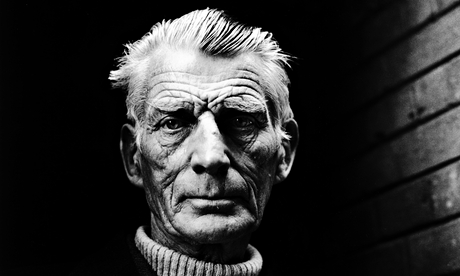
Happy days indeed for Enniskillen, as details are announced of the third annual festival honouring Samuel Beckett, Fermanagh's old schoolboy, useful boxer, celebrated contrarian and renowned author.
This year's festival will bring a constellation of stars to the town by the lakes, with performances including Klaus Maria Brandauer directed by Peter Stein in Krapp's Last Tape, and two productions of Waiting for Godot, one in Yiddish and one in French – the latter will be its first staging in its original language in Beckett's native land.
Splendid eccentricities are also promised, including Beckett burgers in the butcher's (surprisingly humorous with a bitter aftertaste?), Clov and Hamm sandwiches in a local cafe and Beckett haircuts from all the barbers on the main street. The grandeur of the last offer can only be appreciated by anyone who has seen Jane Bown's masterly portrait of the great man, in which he looks like an eagle that has been pulled backwards through a barbed wire fence: magnificent, dangerous, but gravely dishevelled.
Adrian Dunbar will direct a new local professional company in a performance of Catastrophe, a one-act play by Beckett dedicated to the Czech playwright Vaclav Havel, and originally performed when he was imprisoned as a dissident. Dunbar was told by another director that in the wake of the Velvet Revolution, on the eve of his installation as president, Havel was unable to sleep and wandered the streets of Prague – until he saw spray-painted graffiti proclaiming "Godot Has Come", and went home to bed, comforted.
The festival will also include the third instalment of the music-theatre piece I Went into the House but Did Not Enter, by Heiner Goebbels, presented by Théâtre de Vidy Lausanne. This last section includes some of his most famous and most-quoted lines, cherished by many creative types: "Ever tried. Ever failed. No Matter. Try again. Fail again. Fail better."
Dublin tends to claim Beckett as its own, with competition from Paris where he lived and worked for much of his life.
The festival was founded and is directed by Seán Doran, a classical musician who ran English National Opera for several years and has a major festival track record, including stints at festivals in Belfast and Perth. He was born in Derry and educated at its most famous school, St Columb's, and Ireland being a tribal place, was grown up by the time he realised that Beckett had been a pupil at Fermanagh's rival academy, Portora Royal.
A Beckett lover, he went on a literary pilgrimage to the town set between two beautiful lakes that are speckled with hundreds of little islands, and decided immediately it was the perfect place for a festival, and that boats would figure heavily in the programme. Case in point: this year, John Cage's Roaratorio will be presented as a sound installation in the caves of the Marble Arch quarries, which can only be reached by boat after clambering down 150 steps.
He also determined that the festival would always include a performance of Beckett's favourite piece of work by his favourite composer, Schubert's Winterreise – this year's will be by the glorious baritone John Tomlinson, with pianist Julian Drake.
Doran's most anxious moment the first year was a 5.30am performance on a boat. He arrived in the chilly dawn dismally convinced he would be the entire audience – to recognise many people he had left in the pub at 2am already waiting. The dawn performances have become a feature of the festival, and improbable though it may seem to many of his countrymen, Doran insisted they sell out first.
• Tickets for the festival, which runs from 31 July to 10 August, go on sale on Monday

